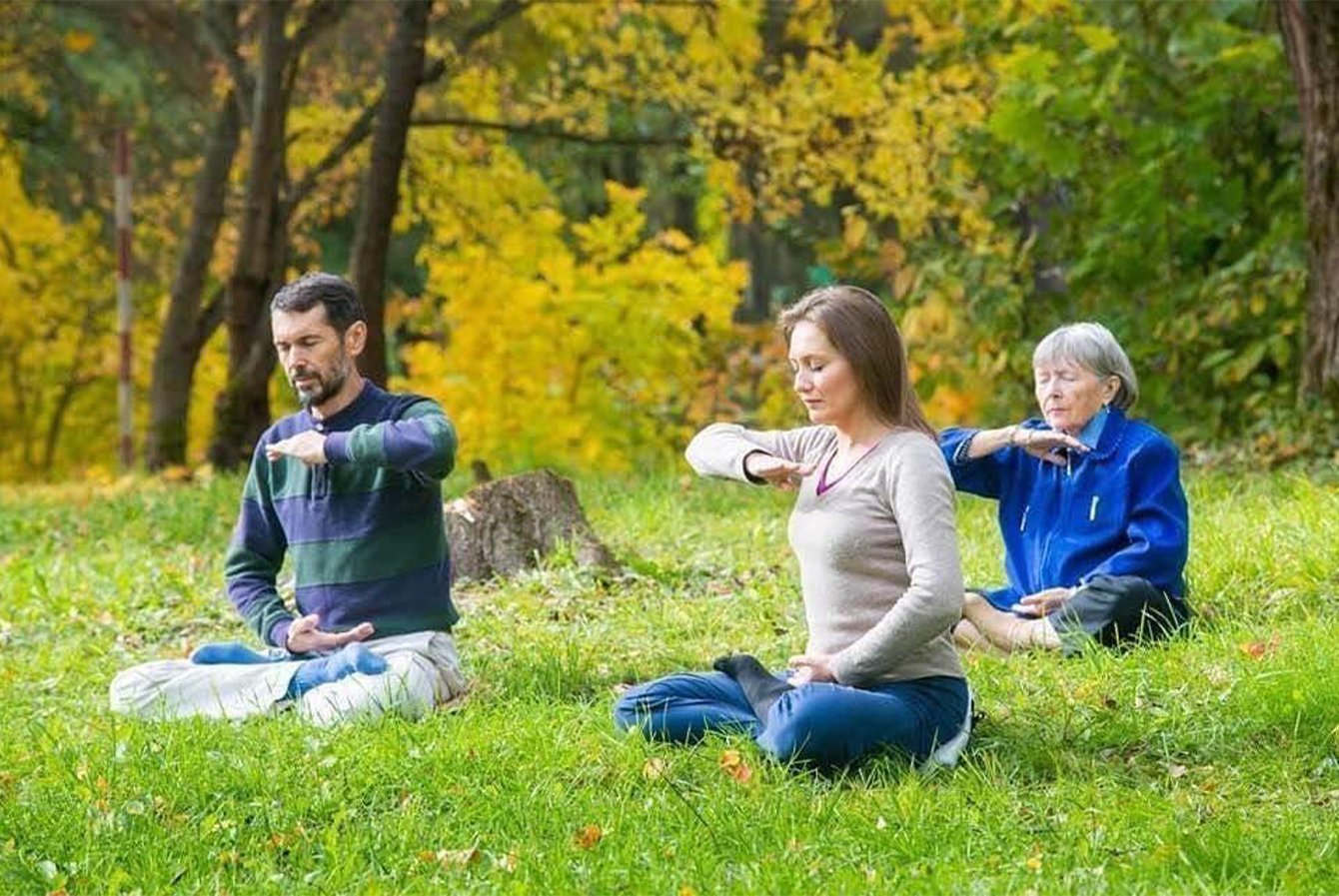
Benefits Of Meditation. The Ancient Technique For Eliminating Stress
Did you know that when you are stressed or tired, you always have an ancient, natural, and 100% free "tool" at your fingertips - meditation - that can restore your energy?
Meditation is an ancient practice rooted in traditional Asian culture that not only has the effect of successfully eliminating the harmful effects of everyday stress, but can also restore your inner peace.
Moreover, meditation can help you rebuild your inner life force and help you develop compassion, tolerance, forbearance, generosity, and not least the ability to forgive.
This ancient relaxation technique is completely at your fingertips, is free, and requires no special equipment. Meditation can be practiced anywhere, including in the park.

Discover The Benefits Of Meditation
Meditation - A Complementary Treatment
Considered a type of complementary medicine, meditation influences the body and the mind. During this practice, attention is focused in one direction, so that chaotic and overwhelming thoughts, responsible for general tension and anxiety, are removed from the mind. The process leads to superior physiological and emotional well-being.
The essential benefit enjoyed by those who practice meditation is that it provides a state of calm, peace, and balance, essential for good health.
The beneficial effects of meditation do not end when the relaxation session is over but continue to have a positive impact on the body and brain long afterward. Some practitioners claim that meditation can even improve the condition of those suffering from certain ailments.
Benefits Of Meditation On An Emotional Level
At the level of emotional well-being, it is believed that meditation brings the following benefits:
- gaining a new perspective on stressful situations;
- development of personal coping skills;
- increased self-awareness;
- focus on the present moment;
- reduction of negative feelings;
Meditation Has Health Benefits
Meditation can be an effective adjuvant in treating certain medical conditions, especially if these disorders are aggravated by stress. These include:
- allergies;
- anxiety disorders;
- asthma;
- emotional eating;
- cancer;
- depression;
- chronic fatigue;
- heart disease;
- high blood pressure;
- chronic pain;
- sleep disorders;
- substance abuse.
A large body of scientific research attests to the benefits of meditation in these regards. However, some doctors think that no conclusions can be drawn about the possible effects of this practice in the actual prophylaxis of medical conditions.
Meditation Techniques
In Asian culture, there are several ways or techniques of meditation, some even passed down from generation to generation. Most of them require entering a trance state, in which case if you are not assisted by a true master to teach and help you, you could face some unpleasant situations and quite serious consequences.
Another option, which is also the safest for those who want to use this extraordinary tool, is meditation in a state of perfect awareness, where you are asked to be perfectly aware of everything that is happening to you while remaining relaxed and detached. Of course, this is not something that can be achieved from the first few attempts, but you will find that, little by little, you will eventually succeed in staying fully aware but completely detached from your surroundings, achieving conscious relaxation of the body and concentration of thought in one direction for a while.
This exercise will distract you from the issues that are causing you the side effects of stress. The body thus gets a break to relax and regenerate by reducing stress hormone levels.
Some techniques ask you to focus your attention on your breathing, others ask you to recite certain mantras, and some ask you to concentrate on a particular object or sound. Other practices suggest the use of imagination, which involves creating a mental image based on a favorite landscape in nature, a dear face, a place that inspires pleasant memories, etc. There are also practices that, when it comes to meditation, advise you to do a body self-analysis, in other words, to focus your attention on certain regions of your body, and various physiological sensations whether it is pain, tension, heat, or tension.

Picture Credit: Falun Dafa at Columbia University
Another meditation technique would be prayer, but it is preferable to be able to say it without thinking about anything but the meaning of the words you say.
Whichever meditation technique you choose, it is important to keep your attention focused at maximum parameters. If external stimuli or extraneous thoughts begin to occupy your mind, immediately stop their flow and return to your meditation practice.
Why Meditation Should Be Part Of Your Daily Routine
Noise on the streets, slamming doors, televisions blaring in the background, phones ringing, tunes blaring from office colleagues' headphones - they're all part of our daily lives, and they all may cause stress, anxiety, frustration, and nerves. If you find it hard to concentrate, have insomnia, or often find yourself getting too worked up over trifles, meditation is the simplest remedy that can change your life for the better.
If we can't control what's going on around us, we can instead control our minds and our reactions. To do this, we need meditation. The idea is to try to distance yourself from what is going on around you and focus on your mind. With meditation, you can focus better, fall asleep, be more positive, control your reactions, and more.
Meditation is about transforming your mind so that you can live as well as possible. The aim of this practice is not to turn you into a new person, but to teach you to see things from a new perspective and understand yourself and others better. The purpose of meditation is also to help you live in the present and focus on what you are doing without your mind "going" elsewhere.
Start with short sessions of a few minutes and gradually build up to 15 to 20 minutes of uninterrupted meditation. If you're just starting you should sit in a comfortable position, preferably on a chair with a backrest. Sit upright, but comfortably, and with your feet flat on the floor. Concentrate on your breathing.
Start with long breaths and gradually return to normal breathing. Pay attention to your body as you breathe and try to focus on this.
Close your eyes and continue to focus on your breath and your body. You'll find that pretty soon your mind will go elsewhere, but that's not a problem. You're just getting started. Gradually you'll learn to focus only on your body, your breath, and your mind, ignoring the noises around you.
Here's What You Can Do During An Effective Meditation Session
1. Sit comfortably in a quiet room. Either sit on a chair or couch or even on the floor in the so-called "lotus" or "semi-lotus" position.
2. Close your eyes.
3. Start by relaxing the muscles of the legs, continuing with the whole body muscles, up to the top of the head (the technique is called progressive muscle relaxation).
3. Concentrate on sitting there calmly, fully aware, and determined to relax, breathing in deeply.
4. Clear your mind of thoughts, but remain perfectly aware, and try not to fall asleep.
5. Continue to do this for 10-20 minutes, daily, trying to keep your mind focused on the practice itself.
Meditation Can Change Your Attitude
- You'll be less stressed
Meditation is so popular for the fact that it helps reduce stress. This practice teaches you to be more patient, more mindful, have a more positive attitude, and last but not least, it helps you control your reactions. This way, having a clear mind makes it much easier not to get angry and stay calm.
- You will be able to concentrate better
- You will be happier
Several studies show that this practice has beneficial effects on the brain and that during meditation the right side of the brain (responsible for positive emotions) is more active than the left. Meditation also makes you more self-focused.
- You will improve your relationships with others
Studies show that people who meditate regularly can be more sympathetic to others and better understand the states others are going through. The result? Stronger and more harmonious relationships.
- You will be more creative
Various scientific studies confirmed this fact - people who meditate show more creativity.
Meditation is an ancient practice rooted in traditional Asian culture that not only has the effect of successfully eliminating the harmful effects of everyday stress, but can also restore your inner peace.
Moreover, meditation can help you rebuild your inner life force and help you develop compassion, tolerance, forbearance, generosity, and not least the ability to forgive.
This ancient relaxation technique is completely at your fingertips, is free, and requires no special equipment. Meditation can be practiced anywhere, including in the park.

Discover The Benefits Of Meditation
Meditation - A Complementary Treatment
Considered a type of complementary medicine, meditation influences the body and the mind. During this practice, attention is focused in one direction, so that chaotic and overwhelming thoughts, responsible for general tension and anxiety, are removed from the mind. The process leads to superior physiological and emotional well-being.
The essential benefit enjoyed by those who practice meditation is that it provides a state of calm, peace, and balance, essential for good health.
The beneficial effects of meditation do not end when the relaxation session is over but continue to have a positive impact on the body and brain long afterward. Some practitioners claim that meditation can even improve the condition of those suffering from certain ailments.
Benefits Of Meditation On An Emotional Level
At the level of emotional well-being, it is believed that meditation brings the following benefits:
- gaining a new perspective on stressful situations;
- development of personal coping skills;
- increased self-awareness;
- focus on the present moment;
- reduction of negative feelings;
Meditation Has Health Benefits
Meditation can be an effective adjuvant in treating certain medical conditions, especially if these disorders are aggravated by stress. These include:
- allergies;
- anxiety disorders;
- asthma;
- emotional eating;
- cancer;
- depression;
- chronic fatigue;
- heart disease;
- high blood pressure;
- chronic pain;
- sleep disorders;
- substance abuse.
A large body of scientific research attests to the benefits of meditation in these regards. However, some doctors think that no conclusions can be drawn about the possible effects of this practice in the actual prophylaxis of medical conditions.
Meditation Techniques
In Asian culture, there are several ways or techniques of meditation, some even passed down from generation to generation. Most of them require entering a trance state, in which case if you are not assisted by a true master to teach and help you, you could face some unpleasant situations and quite serious consequences.
Another option, which is also the safest for those who want to use this extraordinary tool, is meditation in a state of perfect awareness, where you are asked to be perfectly aware of everything that is happening to you while remaining relaxed and detached. Of course, this is not something that can be achieved from the first few attempts, but you will find that, little by little, you will eventually succeed in staying fully aware but completely detached from your surroundings, achieving conscious relaxation of the body and concentration of thought in one direction for a while.
This exercise will distract you from the issues that are causing you the side effects of stress. The body thus gets a break to relax and regenerate by reducing stress hormone levels.
Some techniques ask you to focus your attention on your breathing, others ask you to recite certain mantras, and some ask you to concentrate on a particular object or sound. Other practices suggest the use of imagination, which involves creating a mental image based on a favorite landscape in nature, a dear face, a place that inspires pleasant memories, etc. There are also practices that, when it comes to meditation, advise you to do a body self-analysis, in other words, to focus your attention on certain regions of your body, and various physiological sensations whether it is pain, tension, heat, or tension.

Picture Credit: Falun Dafa at Columbia University
Another meditation technique would be prayer, but it is preferable to be able to say it without thinking about anything but the meaning of the words you say.
Whichever meditation technique you choose, it is important to keep your attention focused at maximum parameters. If external stimuli or extraneous thoughts begin to occupy your mind, immediately stop their flow and return to your meditation practice.
Why Meditation Should Be Part Of Your Daily Routine
Noise on the streets, slamming doors, televisions blaring in the background, phones ringing, tunes blaring from office colleagues' headphones - they're all part of our daily lives, and they all may cause stress, anxiety, frustration, and nerves. If you find it hard to concentrate, have insomnia, or often find yourself getting too worked up over trifles, meditation is the simplest remedy that can change your life for the better.
If we can't control what's going on around us, we can instead control our minds and our reactions. To do this, we need meditation. The idea is to try to distance yourself from what is going on around you and focus on your mind. With meditation, you can focus better, fall asleep, be more positive, control your reactions, and more.
Meditation is about transforming your mind so that you can live as well as possible. The aim of this practice is not to turn you into a new person, but to teach you to see things from a new perspective and understand yourself and others better. The purpose of meditation is also to help you live in the present and focus on what you are doing without your mind "going" elsewhere.
Start with short sessions of a few minutes and gradually build up to 15 to 20 minutes of uninterrupted meditation. If you're just starting you should sit in a comfortable position, preferably on a chair with a backrest. Sit upright, but comfortably, and with your feet flat on the floor. Concentrate on your breathing.
Start with long breaths and gradually return to normal breathing. Pay attention to your body as you breathe and try to focus on this.
Close your eyes and continue to focus on your breath and your body. You'll find that pretty soon your mind will go elsewhere, but that's not a problem. You're just getting started. Gradually you'll learn to focus only on your body, your breath, and your mind, ignoring the noises around you.
Here's What You Can Do During An Effective Meditation Session
1. Sit comfortably in a quiet room. Either sit on a chair or couch or even on the floor in the so-called "lotus" or "semi-lotus" position.
2. Close your eyes.
3. Start by relaxing the muscles of the legs, continuing with the whole body muscles, up to the top of the head (the technique is called progressive muscle relaxation).
3. Concentrate on sitting there calmly, fully aware, and determined to relax, breathing in deeply.
4. Clear your mind of thoughts, but remain perfectly aware, and try not to fall asleep.
5. Continue to do this for 10-20 minutes, daily, trying to keep your mind focused on the practice itself.
Meditation Can Change Your Attitude
- You'll be less stressed
Meditation is so popular for the fact that it helps reduce stress. This practice teaches you to be more patient, more mindful, have a more positive attitude, and last but not least, it helps you control your reactions. This way, having a clear mind makes it much easier not to get angry and stay calm.
- You will be able to concentrate better
- You will be happier
Several studies show that this practice has beneficial effects on the brain and that during meditation the right side of the brain (responsible for positive emotions) is more active than the left. Meditation also makes you more self-focused.
- You will improve your relationships with others
Studies show that people who meditate regularly can be more sympathetic to others and better understand the states others are going through. The result? Stronger and more harmonious relationships.
- You will be more creative
Various scientific studies confirmed this fact - people who meditate show more creativity.

Other Benefits Of Meditation:
- Better memory
- You can make decisions faster and easier
- You will be able to get rid of various addictions
- You get rid of insomnia
- Antidepression
- You can train better
Falun Dafa - We Tried It, And We Recommend It
Falun Dafa, or Falun Gong, is a world-famous school of qigong that has its roots in ancient Chinese traditional culture. It is completely free, and its benefits are immeasurable.
Falun Dafa is a spiritual practice that millions around the world have made a part of their lives. Rooted in the Buddhist tradition, it consists of two main components: self-improvement through the study of moral and spiritual teachings, gentle exercises (qigong), and meditation.
The belief system of Falun Dafa offers the possibility of spiritual growth through disciplined practice. Its teachings encourage learners to let go of unhealthy attachments as they strive to tune their lives to the underlying qualities of the universe: Truthfulness, Compassion, and Forbearance. These are the core values of Falun Dafa.
People who practice Falun Dafa often find it to be life-changing. Many experience dramatic health benefits as well as newfound energy, mental clarity, and stress relief. More importantly, many feel that in Falun Dafa they have found a deeply rewarding spiritual path.
Falun Dafa was originally taught in China by Mr. Li Hongzhi, the practice's founder (or "master," in keeping with Asian tradition). It is now practiced in over 80 countries, and Mr. Li's teachings have been translated into over 40 languages.
The main teachings of Falun Dafa are contained in the book Zhuan Falun. You can read it online, or get it from TIANTI BOOKSTORE. Falun Dafa is always taught free of charge and is open to all.
Falun Dafa is a spiritual practice that millions around the world have made a part of their lives. Rooted in the Buddhist tradition, it consists of two main components: self-improvement through the study of moral and spiritual teachings, gentle exercises (qigong), and meditation.
The belief system of Falun Dafa offers the possibility of spiritual growth through disciplined practice. Its teachings encourage learners to let go of unhealthy attachments as they strive to tune their lives to the underlying qualities of the universe: Truthfulness, Compassion, and Forbearance. These are the core values of Falun Dafa.
People who practice Falun Dafa often find it to be life-changing. Many experience dramatic health benefits as well as newfound energy, mental clarity, and stress relief. More importantly, many feel that in Falun Dafa they have found a deeply rewarding spiritual path.
Falun Dafa was originally taught in China by Mr. Li Hongzhi, the practice's founder (or "master," in keeping with Asian tradition). It is now practiced in over 80 countries, and Mr. Li's teachings have been translated into over 40 languages.
The main teachings of Falun Dafa are contained in the book Zhuan Falun. You can read it online, or get it from TIANTI BOOKSTORE. Falun Dafa is always taught free of charge and is open to all.
If you don't know where you can practice Falun Dafa in your city, please check Falun Dafa – Classes to see the nearest place of practice. You can also learn the practice online.
Author's note
This material is purely informative and cannot be considered a medical prescription. If you want to use meditation to eliminate certain ailments, you are advised to talk to your doctor beforehand.
Meditation is not indicated for people with serious mental disorders or who are unconscious.
Author's note
This material is purely informative and cannot be considered a medical prescription. If you want to use meditation to eliminate certain ailments, you are advised to talk to your doctor beforehand.
Meditation is not indicated for people with serious mental disorders or who are unconscious.


















